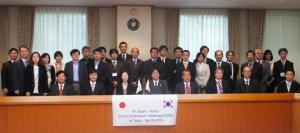A near-decade of collaboration in fusion
15 Jul 2013
-
JA-KO Coordinators Meeting
During the ninth Korea-Japan Joint Coordinators Meeting, participants reaffirmed mutual commitment for a new decade of solid partnership.
In Japan there is a saying: "ten years make an epoch." The import of anything lasting a decade is captured in this statement, the equivalent of which in Korean is, "ten years is long enough to transform the mountains and rivers."
For the past nine years, a strong bilateral cooperation has been underway between Korea and Japan on fusion energy. During a two-day meeting of the Korea-Japan Joint Coordinators Meeting from 25-26 April, participants had the opportunity to reflect on the thick and thin of the years together and cherish the memorable moments.
Key achievements to date include the loan of eight types of auxiliary components (heating and diagnostics) to the KSTAR tokamak, which have been installed and put into operation; close partnership in relation to ITER technology and procurement; and the annual exchange of fusion specialists for ITER and KSTAR (approximately 200 fusion scientists exchange visits each year under the auspices of the Joint Coordinators Meeting). The direct outcome of bilateral cooperation, for example in the areas of diagnostics, heating components and joint testing, has contributed significantly to improving the operational performance of KSTAR.
More recently, Korea and Japan have been spearheading the establishment of guidelines for schedule and cost compliance by Members for the ITER Project.
The two-day meeting last April brought together high-level representatives from both Korea and Japan. Representatives from Korea's Ministry of Science, ICT and Future Planning (MSIP) and the National Fusion Research Institute (NFRI) included MSIP Director Kyung Sook Yoon and President Myeun Kwon of NFRI.
On the Japanese side, the delegation of 19 included Director Shuichi Sakamoto from the International Nuclear and Fusion Energy Affairs Division of the Ministry of Education, Culture, Sports, Science and Technology (MEXT), Director-General Masahiro Mori from the Fusion Research and Development Directorate at JAEA (Japanese Atomic Energy Agency), and Director-General Akio Komori of NIFS (National Institute for Fusion Science).
President Kwon remarked, "As we have walked this path together for the past nine years, I hope to see this relationship continue as we look to a new decade ahead of us and grow into a partnership that will open a new chapter in the history of fusion energy development. I look forward to the discussions at our 10th Joint Coordinators Meeting, where we expect to deal with an important and practical agenda."
As cooperation among Asian countries is critical for the commercialization of fusion energy, bilateral cooperation between Korea and Japan is essential. Bilateral cooperation under the Joint Coordinators Meeting framework is expected to play an increasingly important role. Participants from both nations expressed the wish to see the enduring friendship and solid partnership continue into a new decade.


